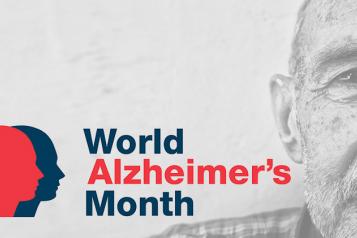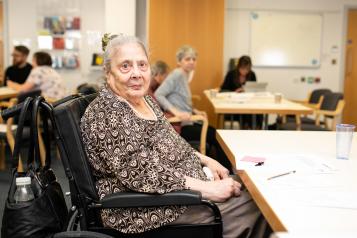Dementia and Alzheimer's - Facts
on in every 20 people under the age of 65 are diagnosed with Alzheimer's

What is dementia?
Dementia is a syndrome (a group of related symptoms) associated with an ongoing decline of brain functioning.
There are many different causes of dementia, and many different types.
Symptoms of dementia
Dementia symptoms may include problems with:
- memory loss
- thinking speed
- mental sharpness and quickness
- language, such as using words incorrectly, or trouble speaking
- understanding
- judgement
- mood
- movement
- difficulties doing daily activities
People with dementia can lose interest in their usual activities, and may have problems managing their behaviour or emotions.
They may also find social situations difficult and lose interest in relationships and socialising.
Aspects of their personality may change, and they may lose empathy (understanding and compassion).
A person with dementia may see or hear things that other people do not (hallucinations).
Because people with dementia may lose the ability to remember events, or not fully understand their environment or situations, it can seem as if they're not telling the truth or are wilfully ignoring problems.
As dementia affects a person's mental abilities, they may find planning and organising difficult. Maintaining their independence may also become a problem.
A person with dementia will usually need help from friends or relatives, including help with making decisions.
The symptoms of dementia usually become worse over time. In the late stage of dementia, people will not be able to take care of themselves and may lose their ability to communicate.
Why it's important to get a diagnosis
Although there is no cure for dementia at the moment, an early diagnosis means its progress can be slowed down in some cases, so the person may be able to maintain their mental function for longer.
A diagnosis helps people with dementia get the right treatment and support. It can also help them, and the people close to them, to prepare for the future.
what is Alzeimer's?
The exact cause of Alzheimer's disease is not yet fully understood, although a number of things are thought to increase your risk of developing the condition.
These include:
- increasing age
- a family history of the condition
- untreated depression, although depression can also be one of the symptoms of Alzheimer's disease
- lifestyle factors and conditions associated with cardiovascular disease
Signs and symptoms of Alzheimer's disease
Alzheimer's disease is a progressive condition, which means the symptoms develop gradually over many years and eventually become more severe. It affects multiple brain functions.
The first sign of Alzheimer's disease is usually minor memory problems.
For example, this could be forgetting about recent conversations or events, and forgetting the names of places and objects.
As the condition develops, memory problems become more severe and further symptoms can develop, such as:
- confusion, disorientation and getting lost in familiar places
- difficulty planning or making decisions
- problems with speech and language
- problems moving around without assistance or performing self-care tasks
- personality changes, such as becoming aggressive, demanding and suspicious of others
- hallucinations (seeing or hearing things that are not there) and delusions (believing things that are untrue)
low mood or anxiety
Getting a diagnosis
As the symptoms of Alzheimer's disease progress slowly, it can be difficult to recognise that there's a problem. Many people feel that memory problems are simply a part of getting older.
An accurate and timely diagnosis of Alzheimer's disease can give you the best chance to prepare and plan for the future, as well as receive any treatment or support that may help.
If you're worried about your memory or think you may have dementia, it's a good idea to see a GP.
If possible, someone who knows you well should be with you as they can help describe any changes or problems they have noticed.
If you're worried about someone else, encourage them to make an appointment and perhaps suggest that you go along with them.
There's no single test that can be used to diagnose Alzheimer's disease. And it's important to remember that memory problems do not necessarily mean you have Alzheimer's disease.
A GP will ask questions about any problems you're experiencing and may do some tests to rule out other conditions.
If Alzheimer's disease is suspected, you may be referred to a specialist service to:
- assess your symptoms in more detail
- organise further testing, such as brain scans if necessary
- create a treatment and care plan
For local support
- Wigan Dementia Action Alliance - The Wigan Dementia Action Alliance is made up of organisations across the whole borough of Wigan, working together to radically improve the lives of people living with dementia and their carers.
- Wigan Alzheimer's Society Dementia Advisers - Wigan Alzheimer’s Society Dementia Advisers provide information, advice and signposting to people with dementia and their carers. This is provided at the point of diagnosis and throughout the dementia journey. Call 0333 150 3456 or email wigan@alzheimers.org.uk
- Wigan Borough Dementia Friendly Community - The Wigan Borough Dementia Friendly Community includes local and national organisations and charities, as well as people living with dementia who all have a common goal to share best practice and take positive action on all things dementia. Email Wigan.DAA17@gmail.com
- Later Life and Memory Service - The Memory Assessment and Treatment Services support people with memory problems like dementia, providing assessment, diagnosis and treatment across Wigan and Leigh. Call 01942 764462.
- The Lewy Body Society - The Lewy Body Society provide information and resources for patients and carers. Their mission is to fund clinical research to improve the diagnosis and treatment of the disease and raise awareness of Lewy body dementia among the general public and those in the medical profession and decision-making positions.


